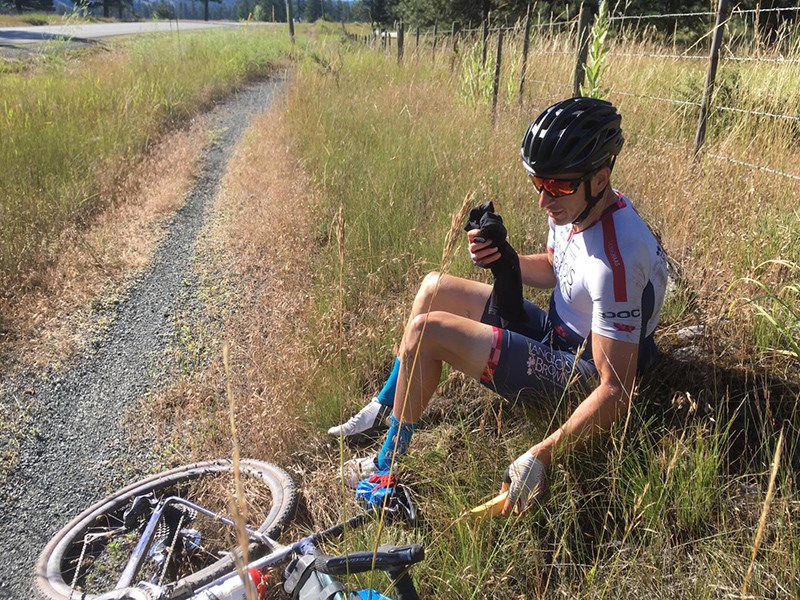Paralympian and Powell River native Tristen Chernove broke the record for the BC Epic 1,000 cycling course through south-central BC by a margin of more than eight and a half hours. His total time was three days, seven hours and five minutes.
Setting off on the course at 4 am on July 18, Chernove rode over challenging conditions along a 1,066-kilometre network of roads and trails to help raise awareness for the Paralympic Foundation of Canada so more Canadians with a disability can access sport and follow their dreams.
Chernove said more than $30,000 has been raised through his ride, and his hope is that the final accounting will be close to $40,000. People wanting to donate can go to the Tristan Chernove BC Epic 1,000 Facebook page, where a link can be found to the donation page.
Chernove said the fundraising was stellar and really what the ride was about.
“I am so full of gratitude and shocked by the generosity we’ve seen, and the interest that this has captured,” said Chernove. “The fundraising is still building momentum now, even though I’m done.”
Chernove said after the ride that he was feeling pretty well, and was getting caught up with his sleep, which was in short supply during his epic endeavour. He said, surprisingly, his body felt pretty good, other than saddle sores from being on the bike over rough terrain for such a long duration.
In terms of his riding strategy, in order to set the record, Chernove wanted to make a ferry sailing across one of the lakes along the way on his first day. The final sailing was 10 pm, but he set out at such a pace that he made it five hours earlier than planned.
“I actually went way too hard on that first day because I was worried about that,” said Chernove. “The result was that I went so hard up over Grey Creek pass, which is the highest road in Canada – a very steep climb for about 45 kilometres – and down to the Kootenay Lake side – in the peak heat of the day.
“I underestimated the degree of heat exhaustion and dehydration going that hard up that hill in the heat. I almost blew it. I made the early ferry but didn’t take advantage of that time because I needed to be cooled down and find shade and just recover.”
Chernove said despite the setback, everything, overall, went incredibly well on the ride. He said he had a couple of little falls but no bad crashes and no major mechanical issues.
“On the bike, I felt pretty strong, considering being on the bike for 18 hours at a time,” said Chernove. “It’s a lot of an ask, but with a couple of hours rest, I would feel okay. The riding felt fine.”
Road conditions during the ride varied. Chernove said a lot of the course is on the Kettle Valley Rail Trail. He said over that portion, as much as he loves the history, the views and where it takes the rider, the surface was difficult. The course in many places was a few inches of sandy gravel with big, chunky and rocky gravel.
“That surface, of constant washboard, I’d be happy to not look at that kind of road surface again for a while,” said Chernove. “The scenery and weather was great but the road surface was not something I enjoyed. But, I was able to power through.”
There were other challenges on the course. Sometimes he had to go through knee-deep water. Also, riding at night was a challenge for him. He said he could have finished right on or just under three days but his battery packs for lighting were getting really low and he wasn’t sure he would be able to make it in the dark without them dying, so he made a safety call. He knew he was still on time to break the record and it wasn’t worth the risk.
On a couple of the days, he had about three and a half hours of sleep. On the second night he only slept for about an hour and a half, in order to make his record-breaking time on the course.
One of the great components of the ride for Chernove is the awareness that has been raised for Paralympic endeavours. He said CBC has captured the story, as have other media sources.
“I want more people who might have challenges and disabilities to visualize themselves achieving whatever they want,” said Chernove. “The story is getting the traction to do that.”
Chernove said the money raised will go into the Paralympic foundation’s Next Gen program for any adaptive para sport; it is not exclusive to cycling. It’s for developing athletes with disabilities early in their performance, he said. He has benefited from the Next Gen program in his own push for excellence.
Chernove is now setting his sights on the Paralympic Summer Games, which are scheduled for 2021 in Tokyo. He said diversity, such as the BC Epic 1,000 ride, keeps the passion alive, but now he is focusing on the Paralympics, in which has medalled several times, including gold.
Chernove said for all of his friends and family in this community, he plans on making a visit to his Powell River home in August. He is looking forward to reconnecting.
Chernove was diagnosed with Charcot-Marie-Tooth disease in 2009. He took up cycling to make his legs as strong as possible in order to slow the effects of the disease, a rare and hereditary muscular atrophy disorder that progresses with loss of muscle tissue and touch sensation, similar to muscular dystrophy.



